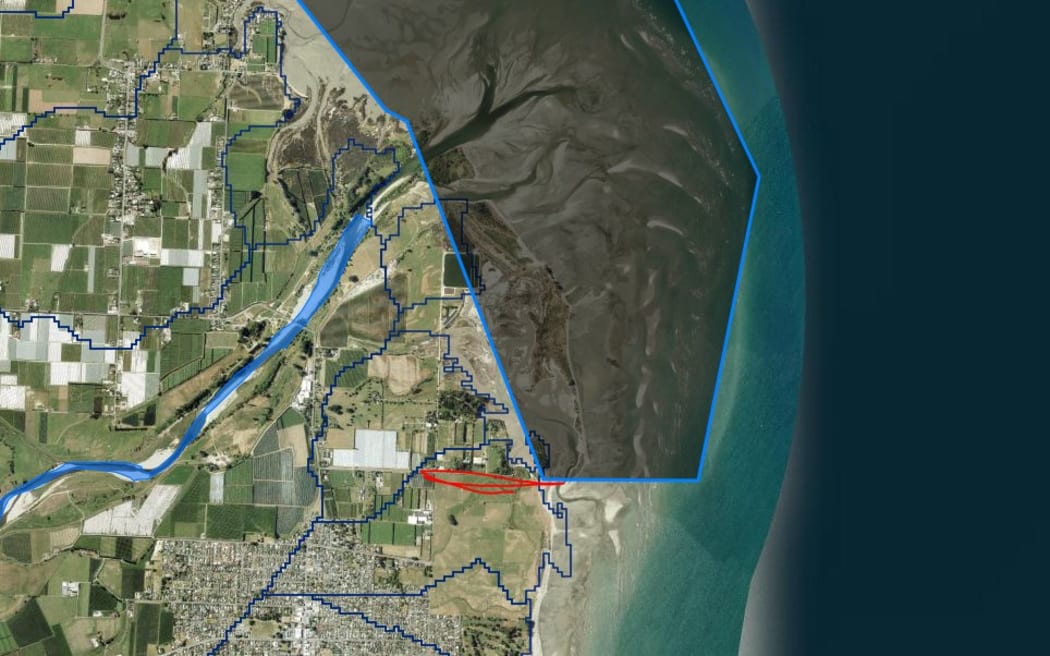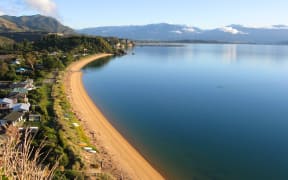
An image of the area where gathering shellfish and whitebait is prohibited due to problems with the Motueka Wastewater plant. Photo: Supplied/ Tasman District Council
There are plans to install new membrane filters in Motueka's Wastewater Treatment Plant by the end of next month, with analysis underway on the existing filters to determine the cause of the problem.
The Tasman District Council issued warnings against collecting shellfish or whitebait from the coastal area around the Motueka River last month, after problems with the filtration membranes were detected at the wastewater treatment plant.
Iwi have since called for a better long-term solution to treat wastewater in the region to protect the health of people and the taiao.
Tasman District Council community infrastructure group manager Richard Kirby said samples of the malfunctioning membranes were undergoing extensive analysis in Sydney, where they were originally manufactured, to determine why they were becoming blocked.
"They are long, thin straws that look like spaghetti and they hang down in these tubes and suck the effluent through and pull out all the very small particles."
There had been problems with the membranes since they were first installed in 2014, but regular acid-washing kept them functioning, until September when they became completely blocked and were no longer working, he said.
Kirby said it appeared a bacterial slime was forming on the membranes that was not easily removed and was potentially because filtrate was being used to backwash them, instead of freshwater, which would be determined by the manufacturers forensic analysis. Those results were expected in the coming weeks, he said.
"We'll do our best to make sure that in the future the backwashing doesn't allow those films to form."
There was a three-month wait for new filters from Sydney, but Kirby said replacements had been sourced from another local council, which had purchased some it did not yet need. He estimated those filters would be installed by the end of November.
"We are working pretty hard to get these new membranes in, get them installed and commissioned."
In the interim, the partially treated wastewater was being pumped into an adjacent wetland area where it was filtered through the ground, which how it was treated before the plant was upgraded in 2014.
"It is not raw sewage ... it has been through two lots of oxidation ponds so it is fairly well treated.
"Because it is on the coast there is concern that some of it may be seeping into the coastal environment and that is why iwi decided to issue a rahui last week."
Long term, the plan is to move the wastewater treatment plant inland, with it scheduled for replacement in 2030.
"In light of what has been happening, if we end up with a solution earlier we will certainly be recommending to council that they bring that timing forward and relocate the plant sooner rather than later so we can deal with the fact it is in a coastal marine environment," Kirby said.
Te Rūnanga o Ngāti Rārua pouwhakahere Shane Graham said the iwi wanted the scheduled replacement to be brought forward as it was not an asset to "sweat to the point of failure".
"We simply cannot risk the health or the mauri of the taiao in one of Aotearoa's most beautiful areas."
Graham said moving the plant to an inland location, where the treated wastewater could be discharged to land rather than awa or moana, was a far better long-term solution.
Te Whatu Ora Nelson Marlborough interim public health service manager Sonya Briggs said it had not received an reports of gastro illness, but not every case of acute gastroenteritis was notifiable and some people managed symptoms at home without needing to seek medical care.
She said the National Public Health Service team was satisfied with the approach Tasman District Council was taking to minimise risks by issuing public health warnings and a map showing the area to avoid, whilst iwi had put a rāhui in place.
The public health service will continue to review the council's sampling and will issue advice if a public health risk is identified.
People who think they have have become sick from eating mahinga kai harvested in the area, should contact their GP and/or call Healthline on 0800 611 116.




